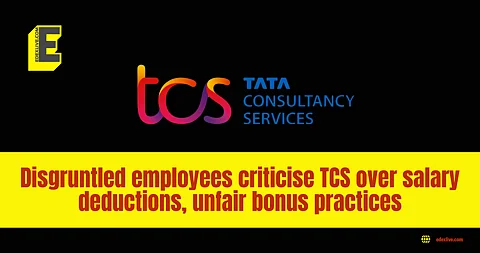

Corporate conglomerate Tata Consultancy Services (TCS), one of India’s largest Information Technology (IT) firms, is under fire for its handling of employee salaries, particularly the controversial Quarterly Performance Bonus (QPB) system.
On June 15, Saubhik Bhattacharya, General Secretary of the All India IT and ITES Employees’ Union (AIITEU), issued a strong statement condemning TCS for what it calls “strategic exploitation” of its workforce through inconsistent bonus payments, which form a significant part of employees’ Cost to Company (CTC).
The statement read, "Several employees of Tata Consultancy Services (TCS) have reached out to AIITEU expressing great discontent over the strategic exploitation by TCS using the facade of Quarterly Performance Bonus (QPB)..."
EdexLive spoke with two TCS employees (names withheld due to privacy concerns) to gain a deeper understanding of how these corporate practices are impacting their financial stability and morale.
Issue with the Quarterly Performance Bonus (QPB)
According to the statement by AIITEU's Saubhik Bhattacharya, TCS’s salary structure consists of fixed and variable components, with the variable part including monthly performance pay and QPB.
The QPB, which is supposed to incentivise employees, is often deducted or reduced based on decisions made by TCS management. Surveys conducted by AIITEU reveal that mid-level employees, such as Assistant Consultants, Associate Consultants, and C4 Consultants, have received only 40-75% of their entitled QPB over the past two years.
On average, this results in a 30% reduction in annual CTC, leaving employees with significantly less than promised.
Furthermore, it stated that "...the payment of QPB is tied to the employees' in-office attendance. Post Covid-19 stage, employees in TCS are now being forced to relinquish the Work From Home (WFH) mode," and added that only people with 85% or above attendance in the office are eligible to receive 100% QPB.
Bhattacharya tagged this policy as "alarming", which adds undue pressure on employees, especially since the bonus is not performance-based but linked to the company’s quarterly revenue growth.
QPB: "Unfair and demoralising"
One TCS employee described their frustration with the mandate. They said that while such a performance bonus is an "added" monetary benefit with the Cost to Company (CTC), in TCS, he noted that it is being included within the CTC, which cancels out the concept of bonuses altogether.
They also said, “The CTC we’re shown includes this quarterly variable pay, but it’s not guaranteed. For example, if my CTC is Rs 12 lakh a year, about Rs 1.5-1.6 lakh is supposed to come from the QPB. However, after deductions, I might receive only Rs 5,000 or Rs 8,000 per quarter instead of the Rs 40,000 I’m expecting. That’s a loss of nearly a lakh annually.”
The employee further explained that these deductions are not always tied to individual performances but to the broader unit’s performance.
“Even if my project is doing well and making good money, I might still get a lower bonus because another project in my unit isn’t performing. It’s unfair and demoralising when your hard work doesn’t pay off,” they added.
These unpredictable deductions can lead employees to doubt their performance and create additional challenges in managing their personal finances. "When you apply for a loan or try to buy something with EMIs, banks look at your CTC to decide your loan amount, but for us, it’s confusing because the CTC and actual salary are never the same, which leads to issues."
A higher CTC usually means you can get bigger loans with better interest rates, like for personal or home loans, but if the CTC shown doesn’t match the actual salary slip, it could lead to loan rejections, cancellations, or even immediate defaults, which can be seen as a serious issue.
Other glaring issues
Another point of contention is the Night Shift Allowance (NSA), which remains at Rs 360 per night without any hike in recent years, despite rising inflation. “This amount hasn’t been revised in over a decade,” said the same employee. “With inflation and price hikes, it’s negligible and doesn’t reflect the effort of working night shifts," they said.
Employees also raised concerns about delayed or insufficient annual increments.
A TCS employee working at an offshore location in Europe, who also requested anonymity, shared with EdexLive the persisting situation within the management. “TCS hasn’t clarified when yearly increments will happen. The increment rates, usually 3-4%, don’t match inflation. For senior executives, that percentage means a huge hike, but for TCS employees, it’s barely enough to keep up with rising costs.”
The offshore employee highlighted additional complexities for those working abroad. “My salary has an Indian component and a local component in euros. The Indian part comes with deductions like city or travel allowances, and the variable pay depends on quarterly profits. Even when TCS is profitable, we see deductions. For senior-level employees, this can mean losing up to 40% of their salary. If your CTC is Rs 24 lakh, you might end up with just Rs 18 lakh.”
Problematic policy on project allotments
TCS's new policy enforced on June 12, 2025, has now come under scrutiny, as it states that if an employee fails to work for a minimum of 225 business days in the last 12 months and has longer unallocated periods (more than 35 business days per year), they might have to face actions as deemed by the policy.
This “bench time” was also flagged as problematic. The offshore employee explained, “If I don’t have a project, it’s not entirely my fault. There’s a department to help find projects, but the policy itself feels unfair." Explaining it further, he says, "It’s similar to deducting my maid’s salary because I didn’t give her work to do.”
The growing consensus and agreement among employees desperately call for a structure that aligns with employees' rights. The general secretary of AIITEU also emphasised the need for fairness in salary structures. “Employees deserve clarity and a salary structure that reflects their hard work,” he stated.
